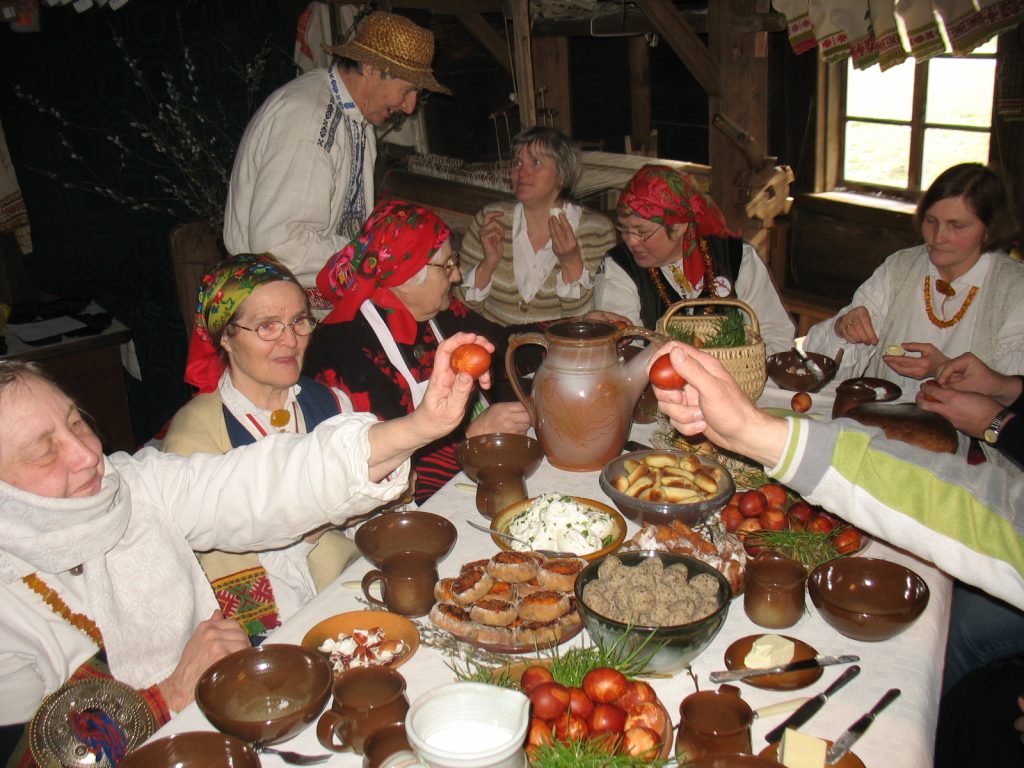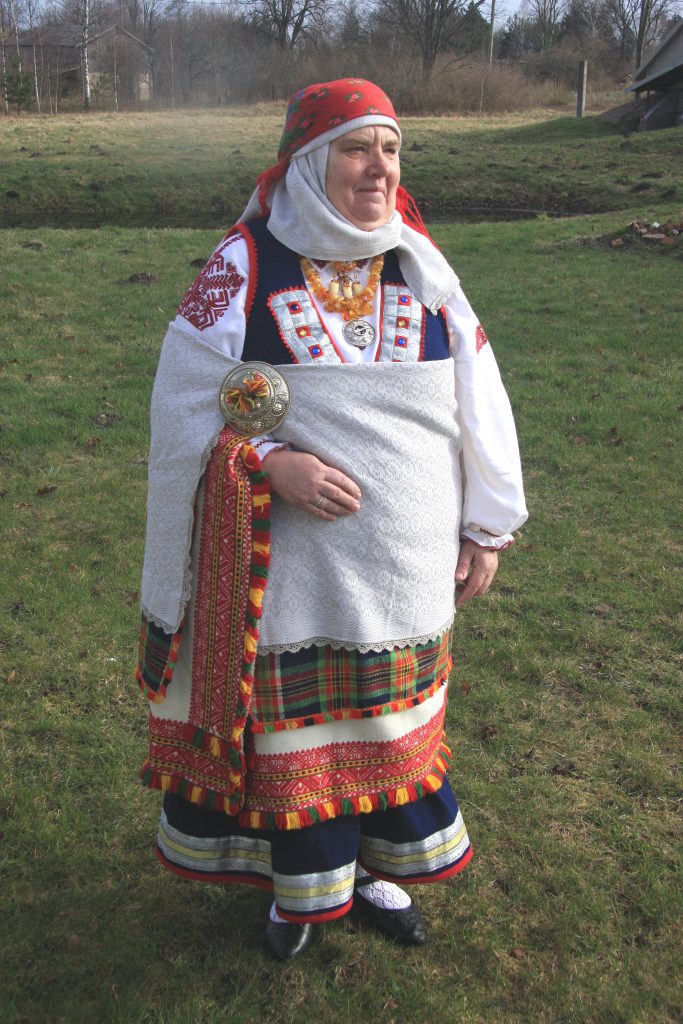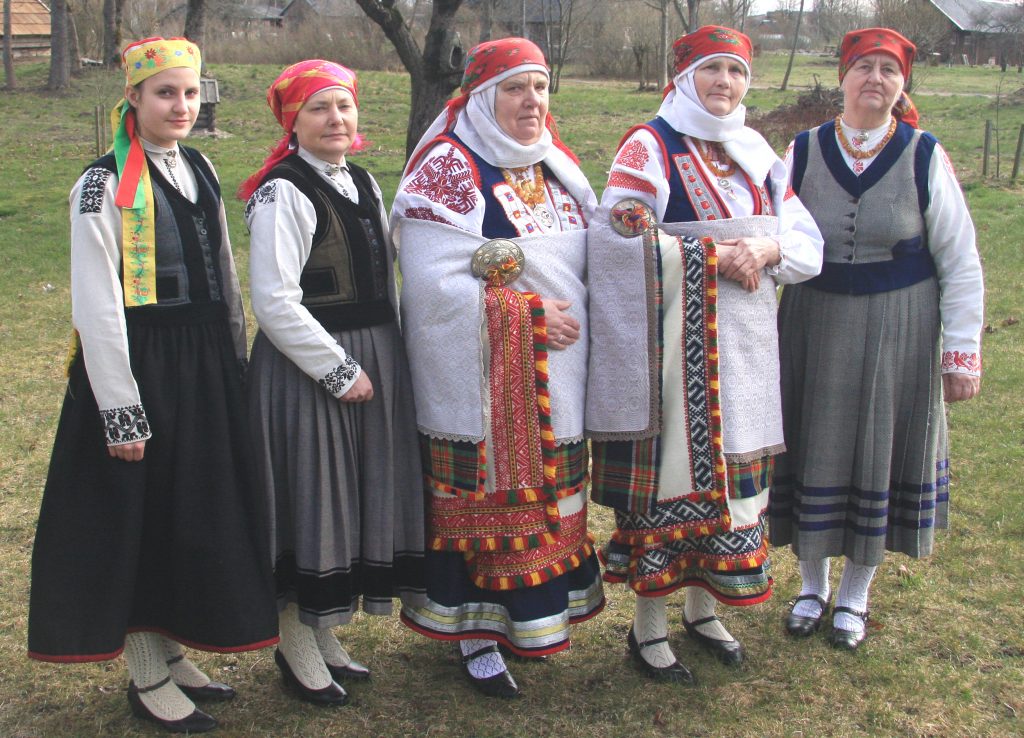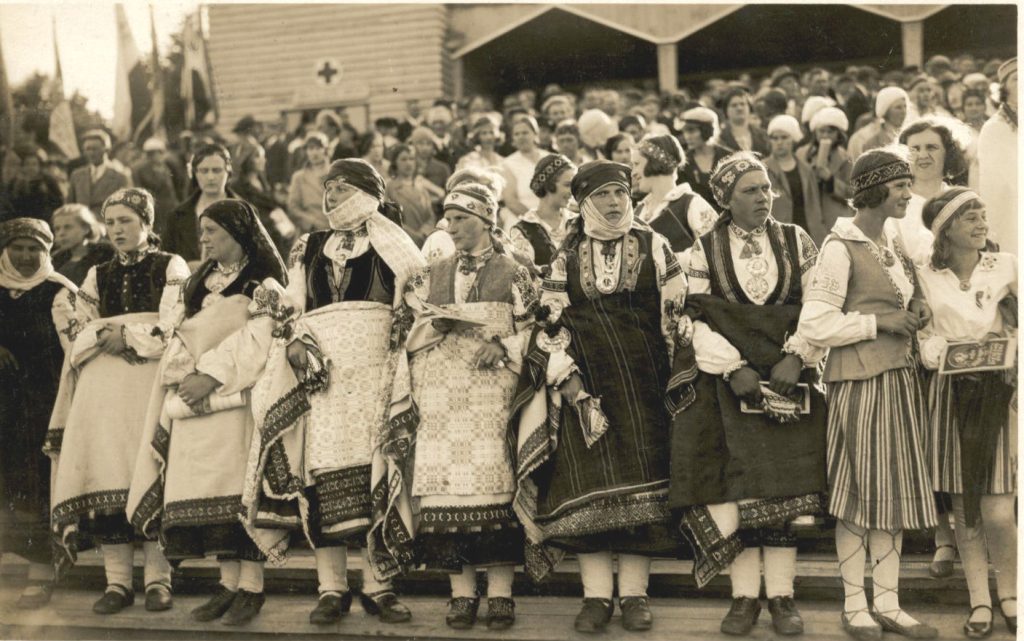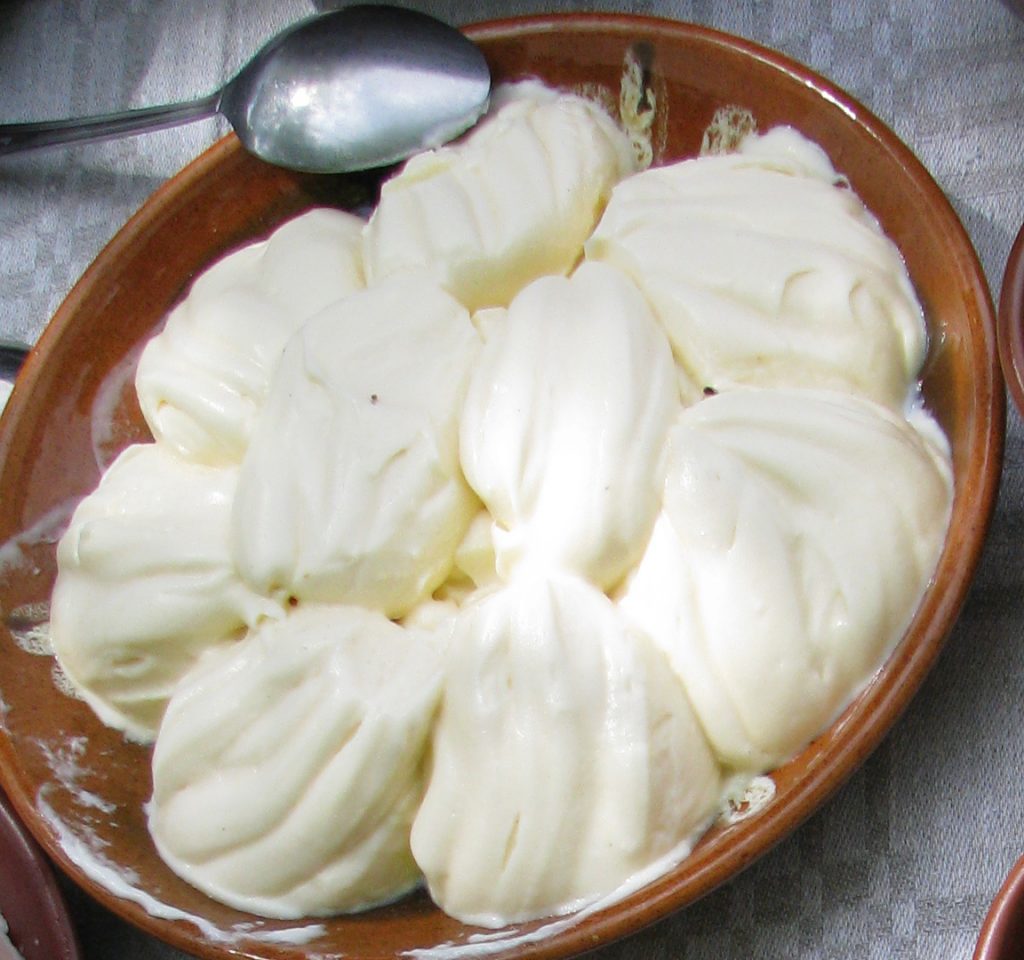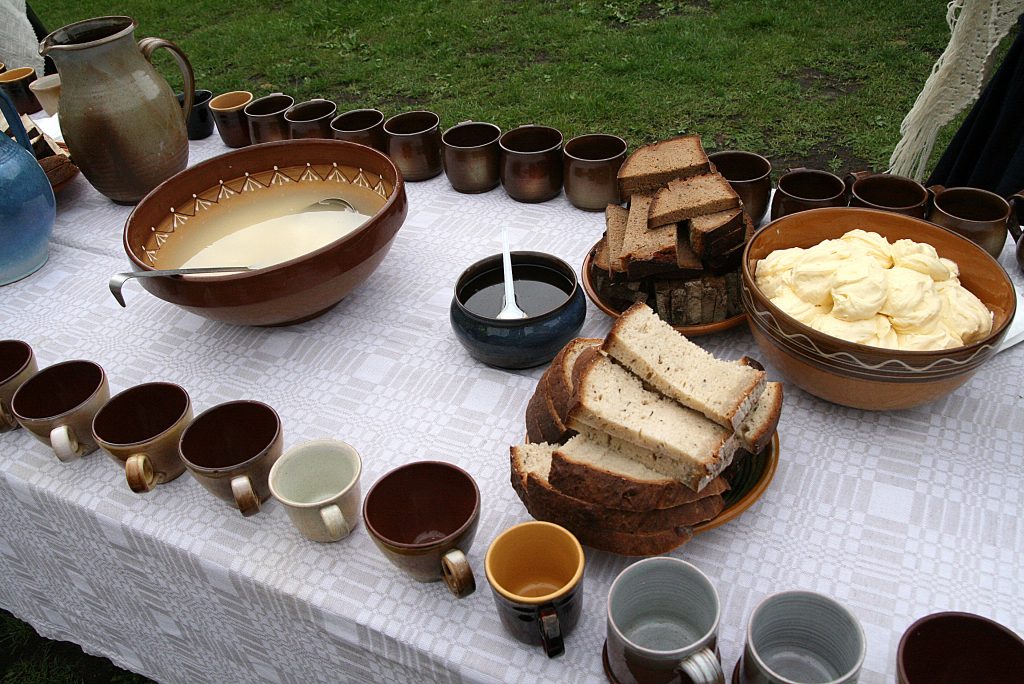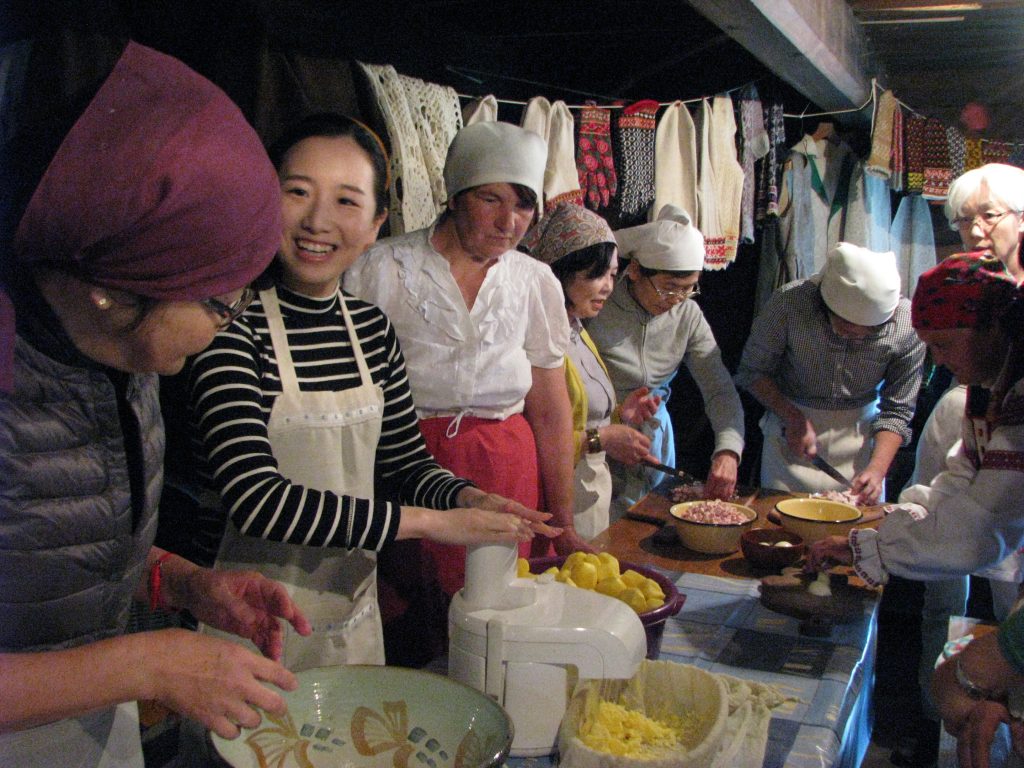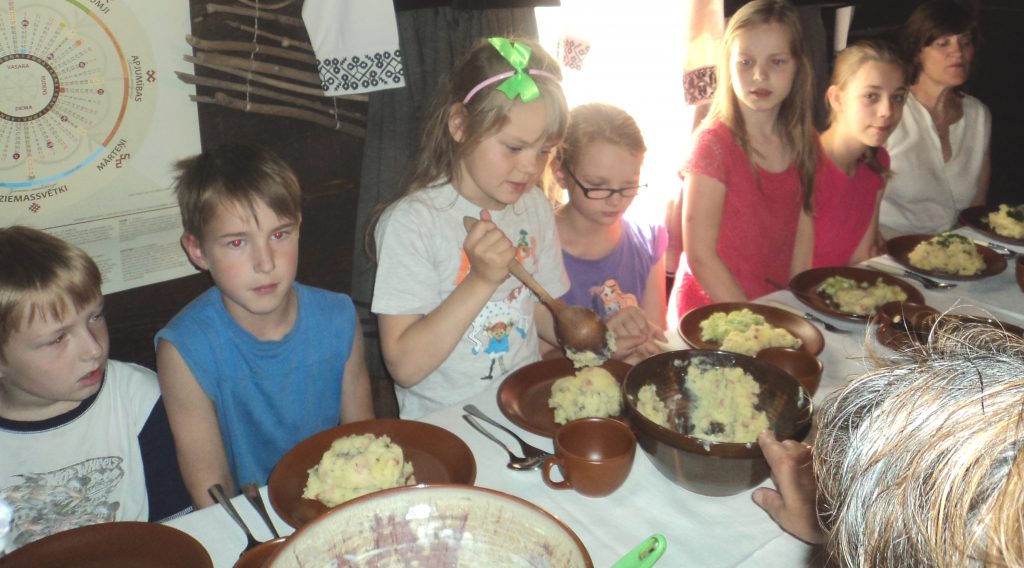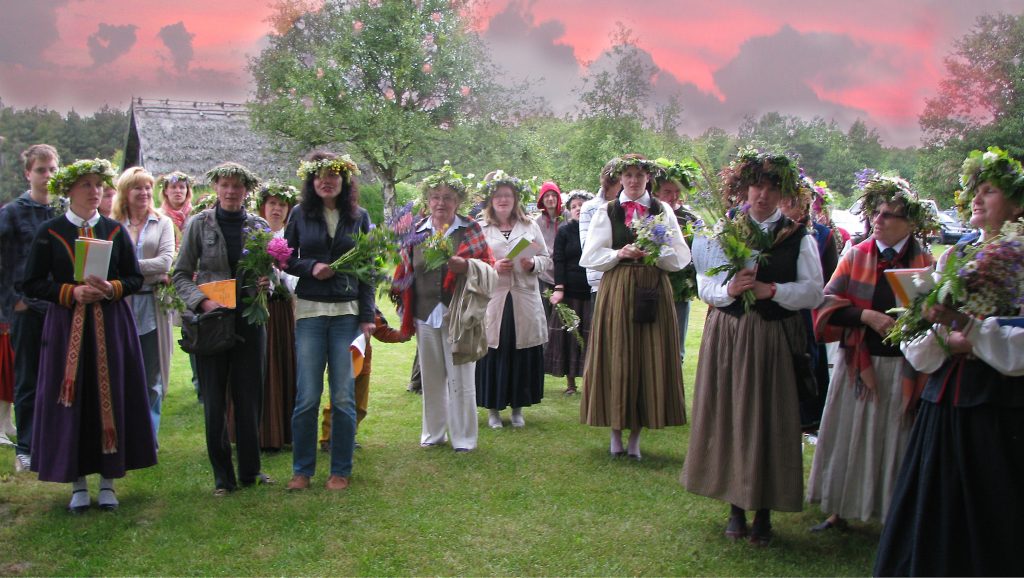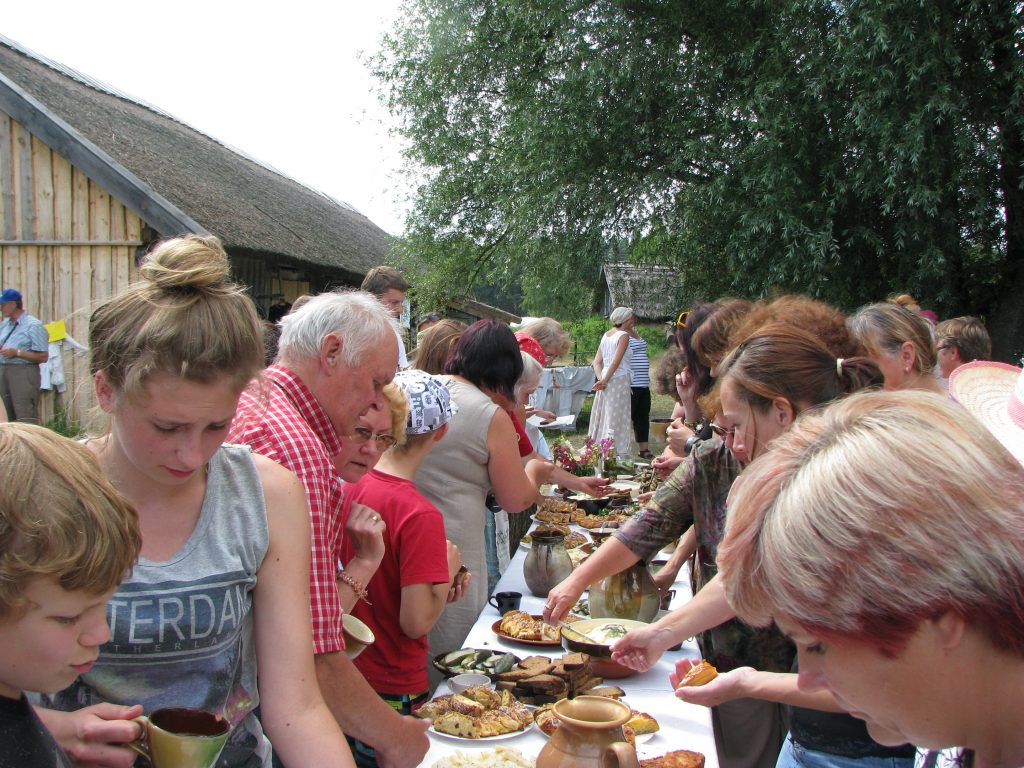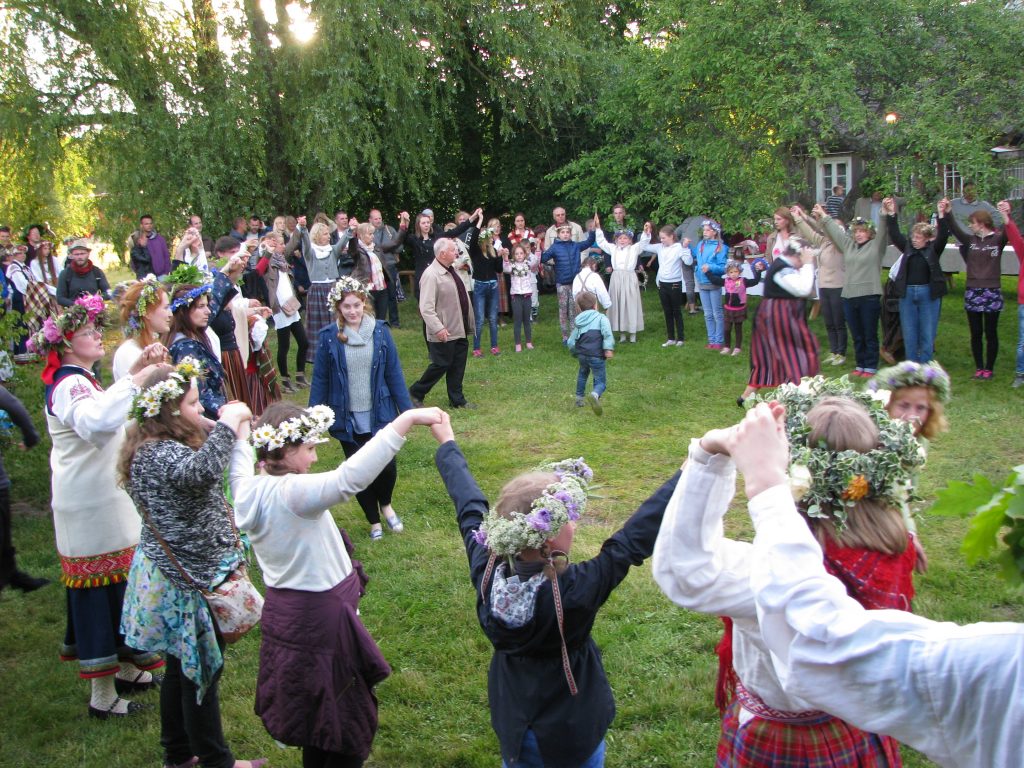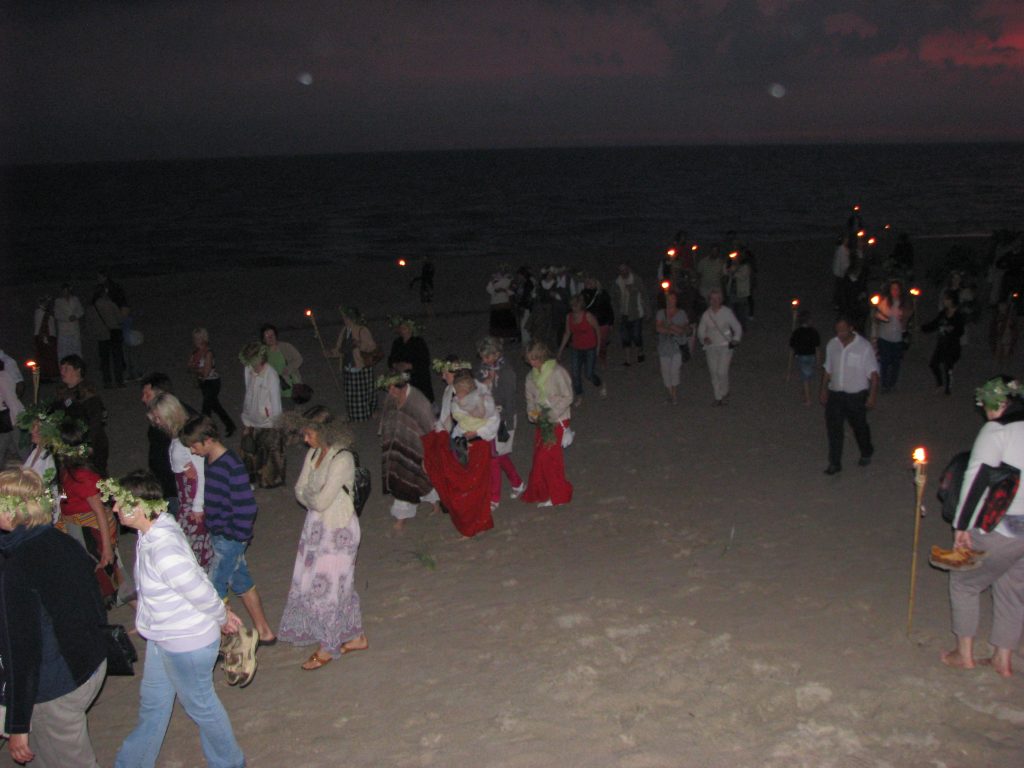Author:
Sandra Aigare
Oral traditions and their expressions, including language as a vehicle of intangible cultural heritage
Social practices, rituals and festive events
Music/performing arts
Traditional kitchen
Traditional craft skills
Knowledge and practices concerning nature and the universe
Title
The Rucava traditional cultural space (2018)
Geography
Southern Kurzeme: the Rucava and Dunika parishes, Kalnišķi village, as well as Būtiņģe un Sventāja in Lithuania (former Latvian territories).
The Rucava cultural space is composed of both individuals and groups.
Individuals who feel that they belong to the Rucava cultural space and are interested in the preservation and transfer of Rucava cultural heritage for future generations can be found in the Rucava and Nīca municipalities,as well as the Rucavians living in Liepāja, and the latvians that belong to the Rucava-Sventāja culture that are living in Lithuania.
Those individuals (238 in total) that are united by their special responsibility for the exploration of Rucava heritage and who are interested and actively engaged in the maintenance of traditions, have united within interest groups (11 groups) and have confirmed with their signatures their readiness to foster the traditions of Rucava. These groups are:
1. Rucava Ethnographic Ensemble,
2. Rucava instrumental band,
3. Rucava Primary School Folklore Collective "Ķocītis",
4. Association "the Rucava Tradition Club",
5. tradition collective "Rucavas sievas" [Women of Rucava],
6. Rucava traditional culture centre,
7. Rucava artisan collective,
8. association "Sventāja" in Liepāja,
9. Courian culture association in Sventāja,
10. association "Atpūta" Klaipēdā,
11. association "Kuršu iniciatīvu fonds" [Courian initiative foundation].
Importance in Community Life
Activities/Actions
The characteristics of the Rucava traditional cultural space of take the form of:
• the folk costume,
• language,
• singing,
• folklore,
• manner of tending the household,
• traditions of work and everyday life,
• seasonal celebrations.
THE RUCAVA FOLK COSTUME is one of three (alongside those of Bārta and Nīca) most plentiful, ornate and ancient folk costumes, which has a vital role in maintaining the local identity and building local patriotism.
The peculiarity of THE LANGUAGE (dialect) OF RUCAVA has evolved over many centuries, incorporating evidence of the contacts of the Baltic peoples (Couronians, Prussians, Lithuanians) and of the influence of German and Slavic languages.
Unlike Bārta and Nīca, where bourdon multi-part singing is the norm, the Rucava culture has maintained traces of the ancient UNISON SINGING. This style of singing can be regarded as a peculiar way of communication.
The regional folklore that used to be a means of communication and artistic expression has become a rich source of information today.
The RUCAVA FOLKLORE has examples of the regional dialect, a rich assortment of four-line folk songs that are still used in different celebrations – krustūbas [baptisms], funerals, field-work gatherings and in general everyday situations. These are an invaluable source of insight into the history, events, places, people, occupations, household life, traditions of work and social life etc.
As Couronian descendants, the Rucavians have tried to maintain their old way of MANAGING THE HOUSEHOLD through the ages – living off of the land, forests and waters. Traditionally, this has been done through agriculture, livestock breeding, fishery, trade crafts. The modern Rucava agriculture and livestock keeping has deep roots and important skills are passed on in everyday life.
RUCAVA WORK AND SOCIAL LIFE TRADITIONS. The Rucava folklore and traditions descriptions offer abundant depictions of celebrations with much associated folklore. The wedding and baptism traditions as well as the customs of collective field work gatherings have not been widely studied so there is still an opportunity to learn a lot about the folklore of these events and incorporate the traditional elements of some of these ancient celebrations into modern life situations.
SEASONAL CELEBRATIONS. The people of Rucava have maintained some ancient seasonal celebration song melodies—they have their own Easter melody, several solstice songs and a song for the ķekatas mask processions. Presently, the seasonal celebration traditions are maintained by the Rucava tradition club.
The Rucava municipality council and people maintaining the traditions realize the value of their cultural heritage and its role in both the development of the area and the contribution to the increased quality of life of each individual. Acquiring their own folk costume and learning the local traditions is a question of honour for many people of Rucava.
More information can be found in the section "Text Resources".
Inheritance and Transfer
History
Although the Rucava cultural space directly borders the Nīca and Bārta cultural spaces, and the centres of those cultural spaces are only 20 kilometres away, their similarities likely indicate an older common origin (like the blue color of lindruki (skirt) of the Nīca and Rucava early folk attire, the red pattern on the bottom hem of the lindruki, the white villaine (cloaks), and the wearing of the villaine around the hips, etc.). However, there are also many differences arising from different influences over different historical periods.
This is especially apparent in the language, which in Rucava has a comparatively large number of borrowed words from Lithuanian, the manner of singing (the multi-part drone singing practices of Bārta and Nīca versus the ancient unison singing that has survived in Rucava and can be seen as a peculiar mode of communication), and the traditions around the making and wearing the traditional clothing (some elements different from their neighbours include the women’s headcloth (nāmats), the young maidens’ head ornament (kaspina), three types of villaine (cloaks) – the white, the plaid (mārģine), and the linen drābule or snātene that in contrast to neighboring areas, is fastened by one or two stacks of saktas (traditional brooch-like jewellery) above the elbow.
The Rucava cultural space developed on the basis of earlier Baltic (Couronian and Prussian) cultures, interacting with Lithuanian, Polish, Russian, Baltic German, Swedish, and other cultures in the more recent history.
Rucava cultural space with its rich, peculiar cultural heritage, with living traditions, still attracts interested people and cultural researchers from both Latvia and other countries.
With its rich and peculiar cultural heritage and living traditions, the Rucava cultural space still attracts enthusiasts and cultural researchers from both Latvia and abroad. The old traditions are not the same today – the everyday conditions and social relations are different now. For example, historically, every Rucava woman made her own special occasion traditional clothing that was worn for every celebration, but today, this tradition is maintained only by the most active and diligent women of Rucava.
The elaborate wedding and baptism (krustūbas) ceremonies have also been lost. The modern weddings and baptisms contain only some of the earlier elements and examples of folk traditions.
Masters
1. Rucava folk costume makers - masters
Seamstresses:
Māra Tapiņa, Aija Cinkmane, Inese Rusmane.
Embroiderers:
Katrīna Vilma Pērkona, Inga Tapiņa, Dace Tapiņa, Aina Erna Antonija, Rasma Kleina, Elga Ozola, Maija Vajevska, Aleksandra Maksakova, Dace Liparta.
Knitters:
Mirdza Ārenta, Vilma Pričina, Rasma Kleina, Rasma Paupere, Māra Tapiņa, Aleksandra Maksakova, Dace Liparta, Inga Tapiņa.
Weavers:
Inga Tapiņa, Aina Erna Antonija.
2. Rucava language speakers, active storytellers
Miķelis Balčus – nominee of the Laiks Ziedonim 2018 competition in the category Bize, see www.youtube.com Aizpute TV film Ciemos pie Sventājas latviešiem [Visiting the Latvians of Sventāja] 23.04.2016
Dzintra Skrube – see www.youtube.com - Aizpute TV film Satikšanās Papes ciemā [Meeting in the Pape Village] 29.12.2017
Inga Tapiņa – nominee of the Laiks Ziedonim 2018 competition in the category Bize; the site www.rucava.lv in its section Rucavas sievas features articles in the “Rucavian language” by Inga Tapiņa
Dace Tapiņa – see www.youtube.com - Aizpute TV film Rucavas pūra vēdināšana kopā ar Daci Tapiņu [Airing the Rucava dowry with Dace Tapiņa] 27.10.2014.
Skaidrīte Zeme – Rucava language speaker, storyteller.
Anna Ilona Roga – Rucava language speaker, storyteller.
3. Singers of the Rucava unison singing (godu balsis)
Anna Veita - included into the Latvian culture map, knows wedding and baptism songs, inherited the manner of singing and assortment of songs from her mother, the widely known local folklore expert Katrīna Grabovska
Olga Dūrēja - the lead singer of the Rucava tradition club, knows wedding and baptism songs, can adapt songs according to the situation and improvise, indirectly learned singing during her childhood from her grandmother and neighbours.
Inga Tapiņa – knows wedding and baptism songs, learned the Rucava traditional singing due to the experiences and impressions of her childhood, is still studying the plentiful Rucava folklore materials, great sense of material, can use folk songs in different situations, uses singing the Rucava folk songs as the ancient communication style.
Aija Dejus - heard her grandmother singing the lead in weddings and baptisms of Rucava in her childhood, remembers the folk songs from her childhood, is studying lead singing in the wedding and baptism songs.
Sandra Aigare - newcomer to Rucava, lead singer of the RTC, learned the celebratory songs of Rucava from local folklore experts (via recordings and in-person meetings).
4. Cooks of the traditional food of Rucava
Mirdza Ārenta – master of the Rucava white butter,
Olga Dūrēja – master of the Rucava hard cheese and fine rye bread,
Maija Vajevska – master of Rucava cheese and mead,
Lilija Vītola – cook of meat foods,
Gunita Pričina – bread baker, master of sausages and meat,
Sandra Aigare – rye bread baker, master of kvass making,
Ruta Ķestere – master of different Rucava foods like riezis [potato gratin], grated potato loaves with sauce, bimbalu tīre [mashed potatoes with bacon] etc.,
Skaidrīte Zeme – master of Rucava traditional foods,
Aleksandra Maksakova – master of Rucava traditional foods, master of fish smoking and cooking foods with fish,
Sandra Roze – Master of the Rucava white butter and other traditional Rucavian foods.
Institutions and Organizations
RUCAVA CULTURE DEVELOPMENT SOCIETY (manager Daiga Straupeniece) - association
Rucava tradition Club (Head Mars tapina) – society
Traditions “Rucava wives” (Head Mar pin)
Rucava craftsman (manager Aleksandra Maksakova) - association
“SVENDER” (manager Daiga Straupeniece) – association
Kurdish cultural association (manager Mikķelis Balčus) – association
Kurdish Initiative Foundation (Board member Maris Muitenieks) – association
Papes Development Society (Senior Maris Muitenieks) – association
South_Kurzeme District and folklore centre (manager Ieva Tel)
Rucava primary school (Director Liena Trumpika)
Rucava PII “bell” (League of League New Land)
Bats in the pre-school group “Purenites”, branch (League of League New Land)
Hotel music school Rucava training point (Director Dina Sleže)
Rucava Branch (manager Gunta Timbra)
Dunik parish branch library (manager Rasma Juzupa)
“Field guards” – antique storage (dawn Padalka)
“Village” – antiques storage (Arta Vecbštika)
fisherman/farmer's funeral “Vītolnieki” papes in the Cologne village - branch of the Latvian ethnographic free museum (Sigmārs Miemis, Director Zanda Kergalve)
Strengthening the Tradition
The progress made to ensure the existence and continuation of the element:
- studied the language of the municipality, issued the book “Latvian language in Lithuania – Bowel and Svener” (2018) (author Daiga Straupeniece, association “SVENNIEKS”, VKKF).
- digitised 3 public storage (Dunics “Farmers”, “callers”, Rucava municipality) textiles material (2020) (Rucava traditions club).
- Centre mills - antiques storage, dragon Jānis memorial exhibition, seminar hall (2020, Rucavas parish council).
- decrypted and published Rucava folklore material, books “Rucavas garamantas I” (2019) and “Rucavas garamantas II” (2022). (Mars Vīksna – book compiler; “science”; Inga pin – material decryption).
- The cultural history has been studied, the book “Jauru of the Jaura family” (2022; Rucava traditions club, Anna Roga – text author, Sandra Aigare – text author, book compiler), “Dunican Time Book 1812-1858” (2022; Rucavas traditions club, VKKF, Rucava municipality council).
- Study of the “Commonwealth”, a video story (2022; traditions “Rucava wives”).
- An exploration of Rucava pottery, a film created, a ceramic workshop in the parish (a paperwork development association).
- photographed, systematised inherited glove material, issued book “Rucava glove heritage” (2023; Aija Jansone – text author, Zieditte museum – text author, Inga pin – glove technical drawing author; “science”, VKF).
- developed concept and content for the presentation tent “Rucava Culture” (2022; Rucava traditions club, tradition set “Rucava wives”).
- annual acquisition of traditional cultural heritage in “caller summer school” (Rucava traditions club, CKF).
- annual traditional cultural festivals in Anne papes “Vītolnieki” (Rucava traditions club, Kurzeme cultural programme).
The above activities have had a significant impact.
1. The conscious, archived and digitised cultural historical material is the basis for the development of various educational programmes, learning methodological materials, beliefs.
2. The varied skills of the positions (adorting, sewing, embroidery, weaving, traditional food preparation, singing, musicisation etc.) have given the opportunity to get to their own honour.
3. The self-awareness of the rucchmen has grown significantly. The soldiers are aware of their traditional cultural heritage, appreciate and proud it.
4. Despite the change of generations (many of the former inheritance depositors have gone forever or become honourable members), a growing number of members are involved in the maintenance of Rucava traditions.
5. Rucava heritage is shown in traditional cultural programmes in Rucava and elsewhere: Liepaja, Riga, Svener, Palanja, Klaipeda.
6. Rucava has become recognizable, Rucava cultural tourism products are popular and requested.
Projects have been supported IN THE CKF project competitions and Kurzeme cultural programme. Funding was obtained by the Rucava traditions club (in the target programme “Development and Sustainability of Intangible Cultural Heritage”): “Support FOR THE strengthening OF RTK for its capacity” EUR 9620 (2021), “" caller 'summer school 2022 ”– EUR 11520 (2022).
The aid was received from the municipality of Rucava municipality: an annual budget for traditional cultural activities in the budget of the Rucava Culture House (EUR 4000). The Rucava Traditional Cultural Centre has been eliminated after regional reform. The Southern Kurzeme District and folklore centre has been established.
The RUCAVA CULTURE DEVELOPMENT SOCIETY has been established, which has assumed responsibility for the preservation of Rucava cultural heritage and the development of the Rucava Culture Area.
Continuity/Development
A variety of measures will be implemented to promote the element's visibility.
1. Publishing of the book “Rucava wife stories”: Documentation of the traditions “Rucava wife” Living and traditions in Rucava Pizza (2012-2022).
2. Preparation and issuance of the book “Anne Roga Rucava”.
3. Preparation and issuance of the Daiga Straupeniece book “Bowel and Svening Territorial Dictionary”.
4. The wedding traditions of rucavants will be studied and documented.
5. In collaboration with Latvian National History Museum and Liepāja Museum, a catalogue of Rucava material heritage (books and electronic format) will be created.
6. Collection of Rucava music material (notes and text), People's songs, thematic arrangement and publication in various inventories.
7. In collaboration with Rucava primary school, Liepaja and Southern Kurzeme educational institutions will be encouraged to study the traditional cultural space of Rucava in pupils' creative competitions and research projects.
A variety of measures are planned for the protection and development of the element.
1. Regular conferences on cultural history topics of Rucava Culture.
2. Annual Summer Sunday festival in Ann Habitats “Vītolnieki”.
3. Annual Traditional Cultural festivals in Anne Pappes Cologne Village “Vītolnieki” – Demonstration of Rucava rich heritage and traditions.
4. The annual “caller” summer school – a summer camp for the population of all generations, where, by attracting masters of different positions, a diverse educational interest education is offered and the intangible and cultural heritage of Rucava has been acquired.
5. Promotion of the recognition of the traditional cultural space of Rucava in a regional, national and international audience, using various forms and opportunities (masters, seminars, lectures, presentations, discussions, exhibitions, publications, social networks Facebook “Rucava cultural space”, website etc.), involvement of the people of Rucava culture in co-operation.
6. “Rucava gloves.” Preparation and extradition of the painting book for children, promoting the sense of belonging of the younger generation to Rucava Culture.
7. Creation of the “Rucava Culture” sign for the identification of the territory (including the names of ancient villages, homes, natural and historical monuments).
8. The gradual development of ancient objects and traditional products for the preservation of the traditional cultural space of Rucava.
Objectives of the planned measures:
- preservation of the rich and valuable traditional cultural heritage of Rucava;
- the prosperity of the people of Rucava culture, the values of their cultural values and their affiliation;
- Recognition of the traditional cultural space of Rucava in Latvia and the world.
Threats to the Tradition
Threats are general in the context of globalisation, the migration of citizens, as well as the limited financial capacity of the Rucava municipality (small municipality and relatively small income from taxpayers).
Applicant
Rucava municipality council, Reg. No. 90000059230
Gallery
Audio Materials
Video Materials
Text materials
Publications
Gintnere, U. (2007) Kā apģērbt rucavnieci. Grām. Rucavā, tur Paurupē. Liepāja: LiePA, 24–38.
Jansone, A. (2010) Līdz mūsdienām Rucavā saglabātie 19.gs. beigu - 20.gs. pirmās puses sieviešu apģērbi. Krāj. Arheoloģija un Etnogrāfija, XXV. Rīga: Zinātne, 243-266.
Jansone, A. (2010) Krievijas Etnogrāfijas muzeja Riharda Zariņa 1909.–1911. gadā vāktā kolekcija. Krāj. Latvijas Vēstures Institūta Žurnāls, 3, 55–67.
Jansone, A. (2011) Rucavas rakstaino adījumu mantojums. 19. gadsimta beigas – 21. gadsimta sākums. Rīga: Zinātne
Jansone, A.(2017) Rucavnieku apģērbs cauri laikiem. Rīga: Zinātne
Rozenberga,V. (1997) Dienvidkurzemes novada tautas tērpi. Grām. Latviešu tautas tērpi II Kurzeme, Rīga: Jāņa sēta, 198.-209.
Ziņģīte, I. (2009) Dažādu kultūras paralēļu apliecinājumi Dienvidkurzemes tautastērpos. Krāj. Kultūrvēstures avoti un Latvijas piekraste. Letonika. Rīga: LZA Vēstis, 214–224.
Ābele, A. (1927.,1928) Rucavas izloksne. Krāj. Filologu biedrības raksti,VII unVIII. Rīga
Laumane, B. (2008) Rucavas izloksnes dzīvotspēja. Grām. Rucavā, tur Paurupē… Etnogrāfija, folklora, valoda. Liepāja, 293.-378.
Markus – Narvila, L. (2011) Rucavas izloksnes vārdnīca: leksiogrāfiskais un leksiskais aspekts. Promocijas darbs filoloģijas doktora grāda iegūšanai valodniecības nozares latviešu diahroniskās valodniecības apakšnozarē. Liepāja novada valoda: Lejaskurzeme.Liepāja: LiePA, 2004.
Markus – Narvila, L. (2012) Krišjāņa Barona Dainu skapja materiāli Rucavas izloksnes morfoloģijas vēsturei. Krāj. Letonikas ceturtais kongress. Novadnieciskās identitātes meklējumi Kurzemē. Liepāja: Liepājas Universitāte, 125.-145
Markus – Narvila, L. (2016) Dienvidrietumkurzemes izloksnes: Bārta, Rucava. Grām. Avoti vēl neizsīkst. Latviešu valodas dialekti 21.gadsimtā. Rīga, 142.-211.
Ozola, I. (2008) Gramatiskās īpatnības un to pārmaiņas rucavnieku valodā. Grām. Rucavā, tur Paurupē… Etnogrāfija, folklora, valoda. Liepāja, 379.-400.
Rucavas izloksnes teksti. Grām. Rucavā, tur Paurupē… Etnogrāfija, folklora, valoda Liepāja, 2008., 401.-468
Izlokšņu teksti: Sventāja, Būtiņģe, Nida, Pape. Grām. No Sventājas līdz Ancei. Liepāja, 2008., 11.- 74.
Straupeniece, D. (2018) Latviešu valoda Lietuvā – Būtiņģē un Sventājā. Liepāja
Aigare, S. (2008.)Rucavas tradīcijas mūsdienās. Grām. Rucavā, tur Paurupē…Etnogrāfija, folklora, valoda. Liepāja, 50. -92.
Melngailis, E. (1951.) Latviešu mūzikas folkloras materiāli. Korsa.-Rīga, 151.-172., 767.-184., 201., 205.
Bendorfs, V. Pielikums Renātes Mielavas ( Vītolas) diplomdarbam, LFK, 16335
Vīksna, M.(2008.). Folkloras vākumi Rucavā un Sventājā. Grām. Rucavā, tur Paurupē…Etnogrāfija, folklora, valoda. Liepāja, 144. – 212.
Andersons, E. Latvju enciklopēdija 1962–1982. 1. sēj. Linkolna : Amerikas Latviešu apvienības Latviešu institūts, 1983–1990.
Ansulis, V. Baltijas dzintars. Rīga : Liesma, 1979.
Bērzs, A. Kūlis, Ē. Jūras dēli : no senatnes līdz veco zvejas laivu kapsētai. Rīga: Jumava, 2018
Bumbieris, J. Rucavas pagasta monogrāfija. [Handwriting. 1920. gadu sākums. Rakstniecības un mūzikas muzejs. Jēkaba Janševska fonds.]
Juškevičs, J. Hercoga Jēkaba laikmets Kurzemē. Rīga : Valstspapīru spiestuves izdevums, 1931.
Kurši senatnē. Rīga : Latvijas Nacionālais vēstures muzejs, 2008.
Latviešu konversācijas vārdnīca. 6. sēj. Faksimilizdevums. Sagat. pēc izd. Gulbja apgādībā. Rīga : Grafīts; Oreols; BaltPRESS LTD, 1992, 1. – 2046. sl
Latviešu konversācijas vārdnīca. 1. sēj. Faksimilizdevums. Sagat. pēc izd. A. Gulbja apgādībā. Rīga : Grafīts; Oreols; BaltPRESS LTD, 1992, 1. – 2046. sl.
Lazdiņš, J.Baltijas zemnieku privāttiesības (XIX gs.). Rīga : Biznesa augstskola „Turība”, 2000.
Laipeniece,L. Vize, I. Kultūrvēsturiskās ainavas un mantojuma izpēte Nīcas un Rucavas pašvaldībās. 2004, 8. lpp. Available: www.daba.gov.lv/upload/

